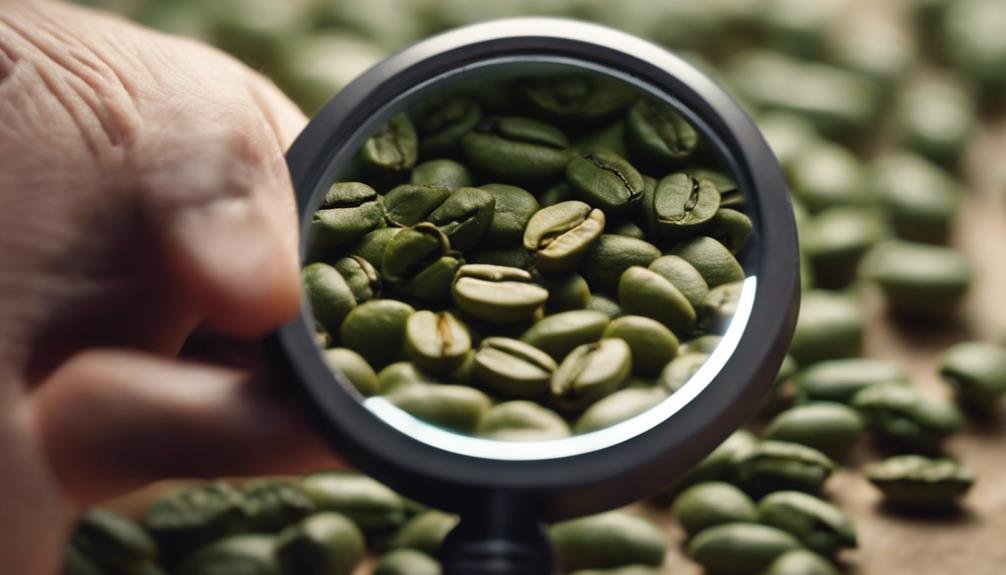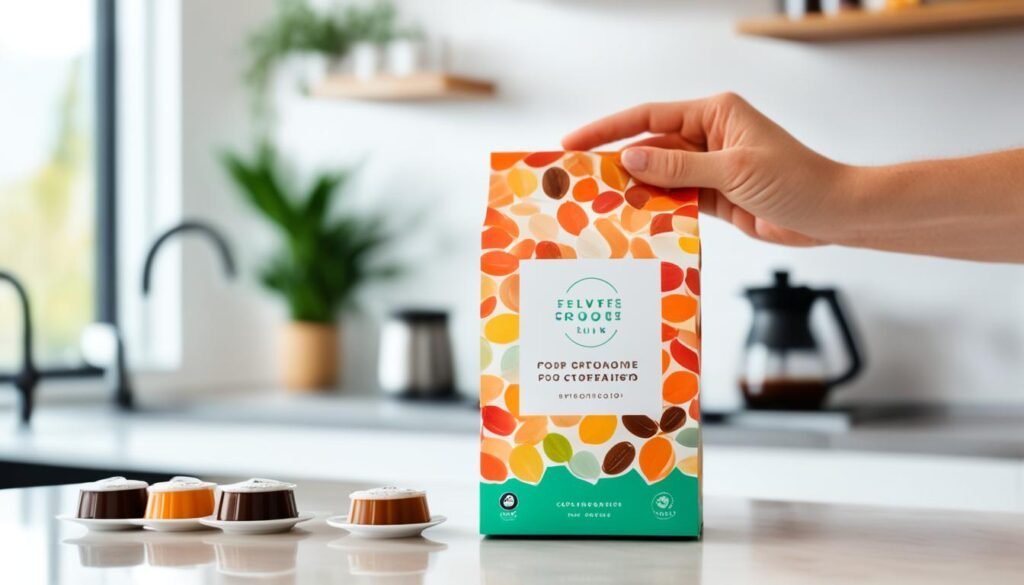Raw coffee beans are generally safe to eat in moderation, but caution is advised. They contain higher caffeine levels than roasted beans, which can lead to jitters, anxiety, and sleep disturbances if consumed excessively. The beans are rich in antioxidants and beneficial compounds, including chlorogenic acid. However, their high fiber content may cause digestive discomfort. Experts recommend consuming 20 to 30 beans daily, depending on individual tolerance and bean size. Raw beans have an unpleasant taste and may trigger heartburn due to their acidity. Alternatives like green coffee extract capsules or lightly roasted beans can offer similar benefits with fewer drawbacks. Further exploration reveals additional insights into this topic.
Safety of Raw Coffee Beans
While raw coffee beans are generally safe to consume, there are several key considerations to keep in mind regarding their safety and potential effects on health.
Raw coffee beans contain higher levels of caffeine compared to roasted beans, which may lead to over-caffeination if consumed in large quantities. Although roasting benefits include improving flavor and reducing acidity, it does not remove harmful elements from the beans.
Caffeine levels in raw coffee beans can be much higher than in brewed coffee, potentially causing side effects such as jitters, anxiety, and sleep disturbances. Raw coffee beans have a strong, unpleasant taste that many find off-putting. Additionally, their high fiber content may cause digestive discomfort for some individuals.
While raw coffee beans offer potential health benefits due to their antioxidant content, moderation is key to avoid potential negative effects.
Health Benefits
Despite their unpleasant taste, raw coffee beans offer several potential health benefits due to their high concentration of antioxidants and other beneficial compounds.
The antioxidant benefits of raw coffee beans are particularly remarkable, as they contain higher levels of chlorogenic acid compared to roasted beans. This compound may help reduce inflammation and support overall health.
Raw coffee beans also provide a significant amount of fiber, with about 3 grams per 30 beans. This fiber content can contribute to digestive health and promote feelings of fullness.
However, it's important to take into account the following factors when consuming raw coffee beans:
- Caffeine intake should be monitored to avoid over-stimulation
- Heartburn risks may increase due to the beans' high acidity
- Digestive discomfort may occur from the concentrated fiber content
While raw coffee beans offer potential benefits, moderation is key to avoiding adverse effects.
Potential Risks

Lastly, it is important to consider that raw coffee beans have a distinct sour, woody, and often unpleasant flavor. This makes them challenging to consume for many people, even when mixed with other ingredients to mask the taste.
Additionally, raw coffee beans offer potential health benefits, but they also come with several risks that consumers should be aware of before incorporating them into their diet. One of the primary concerns is digestive issues. The high fiber content in raw coffee beans can lead to stomach discomfort, bloating, and diarrhea, especially when consumed in large quantities. Moreover, the acidity of raw beans may trigger heartburn risks in individuals prone to acid reflux.
Another consideration is the elevated caffeine levels in raw coffee beans compared to roasted ones. This can potentially lead to caffeine overdose, causing jitters, anxiety, and sleep disturbances.
Recommended Consumption Amount
Given the potential risks and benefits associated with raw coffee beans, experts recommend consuming no more than 20 to 30 beans per day. This guideline applies regardless of bean variety, as different types may contain varying levels of caffeine and other compounds.
When considering raw coffee bean consumption, it's important to note that:
- Bean size affects the recommended quantity
- Individual caffeine tolerance plays a role in determining safe consumption
- Health conditions may necessitate further limitations
Unlike traditional brewing methods, which extract specific components from the beans, eating whole raw coffee beans provides a concentrated dose of all their constituents. This includes not only caffeine but also fiber, antioxidants, and potentially irritating substances.
While some people may tolerate higher quantities, it's advisable to start with a smaller amount and gradually increase if desired, always staying within the recommended range to minimize potential side effects.
Alternatives to Raw Beans

For those seeking the benefits of raw coffee beans without directly consuming them, several alternatives are available. Green coffee extract, available in capsule form, offers a concentrated source of antioxidants and chlorogenic acid without the unpleasant taste of raw beans. This extraction method preserves the beneficial compounds while eliminating the need to consume whole beans.
Lightly roasted coffee beans provide a middle ground between raw and fully roasted options. The roasting process enhances flavor while retaining a significant portion of the antioxidants found in raw beans.
Additionally, cold brew coffee made from coarsely ground beans uses a gentle extraction method that preserves more of the beneficial compounds compared to traditional hot brewing. These alternatives allow consumers to enjoy the potential health benefits of coffee beans without the drawbacks associated with consuming them raw, such as digestive discomfort and an unpalatable taste.
Conclusion
Raw coffee beans present a complex nutritional profile, offering potential health benefits alongside notable risks. Like a double-edged sword, their high antioxidant and fiber content is counterbalanced by concerns over digestive issues and caffeine overload.
While limited consumption may be safe for some, alternatives like green coffee extract provide a more controlled option.
Ultimately, the safety of raw coffee beans depends on individual factors and moderation, highlighting the importance of informed decision-making in dietary choices.












